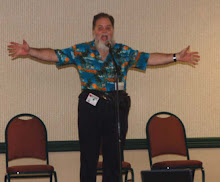A guest blog by Trudy Myers.
Living in Omaha, Nebraska, involves a number of challenges to those of us who want to write. The one we'll consider today is the difficulty of finding other writers who can help improve one's writing.
I've tried finding local writer's work groups since the one I had fell apart in the 90s. Sometimes, a bookstore will host one, but those are seldom very satisfying. When you write fantasy and science fiction, it's not often that a poet or a romance writer can help you hone your skills. They don't understand the 'rules' of science fiction and fantasy. Maybe they can't get past the fact that they don't understand your science, or maybe they just don't accept the existence of magic.
Been there. Done that.
Even living in the huge Midwest, you can find workshops; either on-line, or by traveling to another city. I've done that, too. Three-hour commute, four-hour workshop, three-hour commute makes for a long day.
You could make arrangements to attend an intensive 6-week course. Okay, I've only done that one on-line.
Or you can attend critique groups and workshops at (some) science fiction conventions. That's the one I do the most of these days.
OSFest is one of those science fiction conventions, and it is held in Omaha in July. It has a writer's workshop associated with it, of the 'critiquing session' variety. It is organized and 'administered' by Matt Rotundo, a local Omaha author. In 2008, it had four participants. To be a participant requires some forethought and preparation, in addition to the desire to write, so this is not for everybody.
If you want to try this, check out the workshop guidlines at: http://www.osfes.org/2009OSFESTWritingWorkshopInformation.pdf and be sure you sign up for the workshop. You can do that by emailing Matt Rotundo at mrotundo@yahoo.com, with "OSFest Writing Workshop" in the subject line. There will be a deadline for sending in a copy of your story to be critiqued, properly formatted. Pretend you are sending this story in to an editor and format appropriately. If you aren't sure what that is, formatting guidelines can be found at http://www.shunn.net/format/story.html
Shortly after that, but before the convention, Matt will send copies of all the stories to each participant. At that point, your job is to read the stories and make notes about them. What didn't work for you, what did? Were there holes in the plot or the characterizations? Was some part unclear, or did a phrase seem particularly well turned? Bring those notes with you to the workshop at the convention.
During the workshop, you'll get a chance to make your observations about everybody else's story. They will comment on yours. Written notes will also be exchanged. Therefore, you'll get a chance to learn in two ways; by studying the work of others, and by having them critique yours.
I'll be there. Hope you will be, too.


